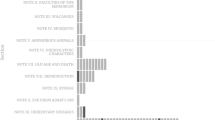Abstract
IN NATURE of October 14 my friend and colleague, Mr. L. T. Hogben, contributes a thoughtful letter on “Recapitulation and Descent,” on which you will, perhaps, allow me to make one or two comments. Mr. Hogben traverses the position taken up by Dr. Bather in his address to the Geological Section of the British Association that “recapitulation” in the development of animals is a proof of evolution. His objection is that “experimental breeding” does not justify the inference that a mutant recapitulates the characters of its ancestral type, and that “factorial omission” rather than “the perennial desire of youth to attain a semblance of maturity” is the key to “the omission of some steps in the orderly process.”
This is a preview of subscription content, access via your institution
Access options
Subscribe to this journal
Receive 51 print issues and online access
$199.00 per year
only $3.90 per issue
Buy this article
- Purchase on Springer Link
- Instant access to full article PDF
Prices may be subject to local taxes which are calculated during checkout
Similar content being viewed by others
Author information
Authors and Affiliations
Rights and permissions
About this article
Cite this article
MACBRIDE, E. Recapitulation and Descent. Nature 106, 280–281 (1920). https://doi.org/10.1038/106280b0
Issue Date:
DOI: https://doi.org/10.1038/106280b0
This article is cited by
-
?Enfant Terrible?: Lancelot Hogben?s Life and Work in the 1920s
Journal of the History of Biology (2016)
Comments
By submitting a comment you agree to abide by our Terms and Community Guidelines. If you find something abusive or that does not comply with our terms or guidelines please flag it as inappropriate.



